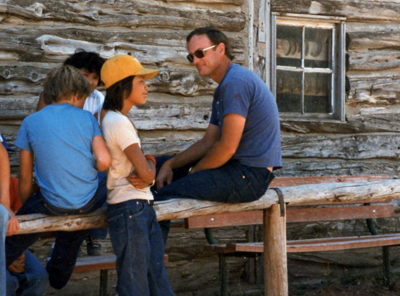Frank Dornstauder travelled back more than 50 years to retrieve memories of working alongside Ranch Ehrlo Society’s founder, the late Dr. Geoff Pawson. The vivid memories provide insight into the inspiration for the beginning of an organization which has grown to encapsulate the diverse array of services for children, youth, families, and communities in need.
Frank worked alongside Geoff in 1962 at the Saskatchewan Boys’ School. At the time Frank was working as a caseworker, providing mentorship and a listening ear to a determined friend and co-worker, Geoff Pawson.
Then in his early 20s, Geoff had relocated from southern Alberta with wife Barb and infant daughter Jane to pursue a position as the Saskatchewan Boys’ School as the institution’s first group social worker.
Geoff spent his evenings and weekends working with 20 children at the Saskatchewan Boys’ School, supporting their treatment and rehabilitation. It was a different era, Frank said, when institutions worked under the rigid legislation of the Juvenile Delinquents Act.
“At that time there was a different attitude and different approach to working with kids who were emotionally disturbed,” Frank explained. “But Geoff had a different concept for the treatment of children. He saw that there needed to be more follow-up, more long-term care. He thought the issues didn’t develop in a day and weren’t going to go away in a day.”
 Dr. Geoff Pawson with Ranch Ehrlo youth
Dr. Geoff Pawson with Ranch Ehrlo youth
The children coming into the Saskatchewan Boys’ School were filtered through by the Canadian justice system and were rehabilitated over a brief period of time, often determined by the courts.
“I think he saw an opportunity and possibility for greater intervention and I think it was that which attracted him to the idea of what has become Ranch Ehrlo,” he continued. “I remember having a discussion with Geoff about going above and beyond what the province was doing to help these children. I think he was thinking ‘I can do something more.’”
Frank believes it was Geoff’s unwavering commitment and advocacy for children which made Ranch Ehrlo Society, and a model of long-term care for youth in Canada, possible.
“He had an extraordinary skill in motivating people in the community to develop an understanding of the needs of the children and gaining support to provide them with the resources they needed,” said Frank.
“He always knew where he was going. Ranch Ehrlo has evolved, but it all started with a certain philosophy that Geoff built upon as he gained more knowledge of the human condition and more knowledge of what issues the kids were facing.”


